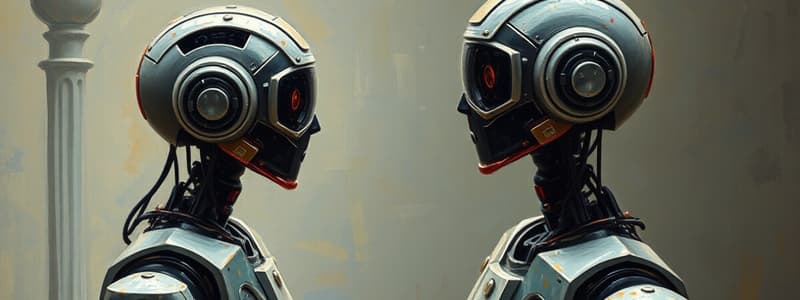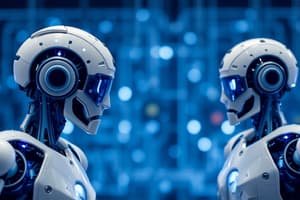Podcast
Questions and Answers
What is the primary function of a reflex agent in artificial intelligence?
What is the primary function of a reflex agent in artificial intelligence?
- To perform complex reasoning tasks
- To store and recall past experiences
- To respond to immediate conditions with a specific action (correct)
- To make decisions based on future predictions
Which of the following best describes the role of a sensor in a control system?
Which of the following best describes the role of a sensor in a control system?
- It stores information about past conditions
- It executes actions based on signals
- It analyzes data and makes decisions
- It detects conditions and converts them into signals (correct)
Which rule is NOT one of the main principles for an AI agent's operation?
Which rule is NOT one of the main principles for an AI agent's operation?
- Use observations to make decisions
- Generate complex algorithms (correct)
- Perceive the environment
- Take rational actions based on decisions
What is a significant limitation of simple reflex agents?
What is a significant limitation of simple reflex agents?
How do model-based agents improve upon simple reflex agents?
How do model-based agents improve upon simple reflex agents?
What function does an actuator serve in a control system?
What function does an actuator serve in a control system?
What is an example of a reflex action in AI?
What is an example of a reflex action in AI?
Which of the following is a characteristic of simple reflex agents?
Which of the following is a characteristic of simple reflex agents?
Which component directly interacts with the physical environment to carry out actions in a control system?
Which component directly interacts with the physical environment to carry out actions in a control system?
What type of environment do reflex agents operate in?
What type of environment do reflex agents operate in?
Flashcards are hidden until you start studying
Study Notes
AI Agents Overview
- AI systems focus on rational agents that sense and act within their environments.
- Agents utilize sensors for observation and actuators for action.
Types of Agents
- Human-Agent: Uses sensory organs (eyes, ears) and actuators (hands, legs).
- Robotic Agent: Employs cameras, infrared sensors, and motors.
- Software Agent: Operates through keystrokes and file contents, displays output through screens.
Devices of Agents
- Sensors: Detect environmental changes, providing information to electronic devices.
- Actuators: Convert energy into motion, responsible for system movement (e.g., electric motors).
- Effectors: Physical devices that influence the environment (e.g., wheels, legs).
Real-Time Example: Automatic Door
- Motion Sensor: Detects presence of individuals approaching the door.
- Electric Motor: Controls door movement based on sensor signals.
Decision Making in Agents
- Employs climate control algorithms to optimize comfort while minimizing energy consumption.
- Balances conflicting goals and weighs the likelihood of success against goal importance.
Learning Agents
- Incorporate a learning element to enhance knowledge over time.
- Use feedback to adjust performance, improving accuracy and effectiveness.
Components of Learning Agents
- User Input (Sensor): Collects commands via microphone or text.
- Internal Model (User Preferences & Context): Tracks preferences for personalized interactions.
- Learning Element: Utilizes machine learning to enhance capabilities.
- Performance Element: Executes tasks based on the current state.
- Critic: Evaluates agent actions through user satisfaction.
Four Fundamental Rules for AI Agents
- Must perceive the environment.
- Utilize observations for decision-making.
- Resultant decisions lead to actions.
- Actions must be rational and logical.
Types of AI Agents
-
Reflex Agents: Respond immediately to stimuli without considering past states; rely on the event-condition-action rule.
- Real-Time Example: Automatic Light Switch, which activates with motion detection and deactivates when no motion is sensed.
- Limitations: Very basic intelligence and lack of knowledge about non-perceptual state aspects.
-
Model-based Agents: Utilize a more extensive view of the environment to inform their actions unlike reflex agents.
Studying That Suits You
Use AI to generate personalized quizzes and flashcards to suit your learning preferences.




